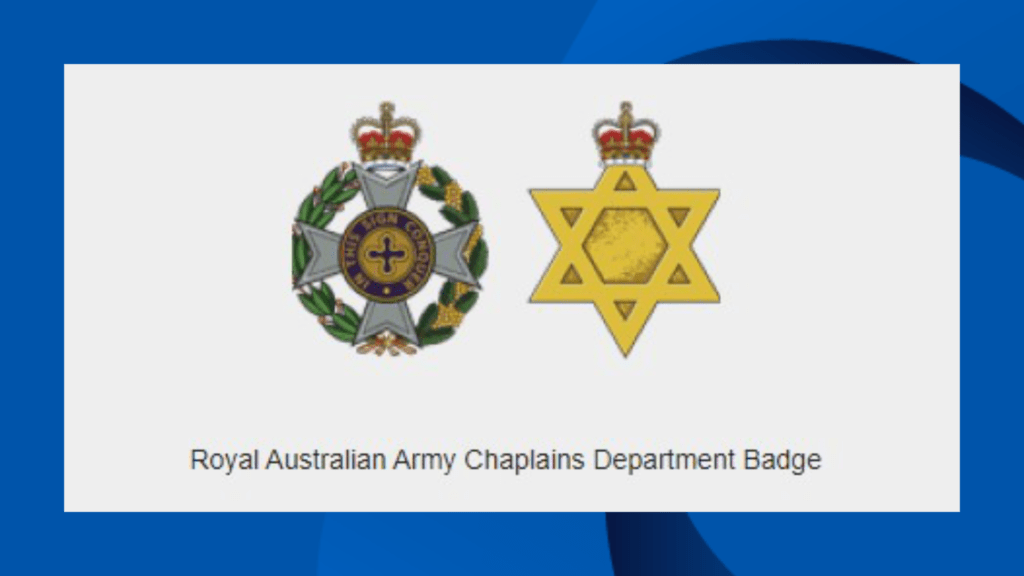The Rationalist Society of Australia has questioned the Albanese government’s Defence ministers about the appropriateness of some Army personnel wearing ‘crusader’ emblems as part of their formal uniform.
In a letter to Defence Minister Richard Marles and Defence Personnel and Veterans Affairs Minister Matt Keogh last month, RSA president Meredith Doig raised concerns about the emblem worn by religious chaplains in the Royal Australian Army Chaplains Department (RAAChD).
The emblem on RAAChD uniforms says “In this Sign Conquer” inlaid over a Maltese Cross.
In 2015, Defence said it would remove the emblem from Army chaplain uniforms due to its connotations with the Crusades. In response to media reports, however, the then government denied that a decision had been made to remove the emblem.
In her letter, Dr Doig said the wearing of ‘crusader’ emblems also raised potential security threats to Army personnel operating in foreign countries.

Source: Royal Australian Army Chaplains Department
“We are concerned about the ongoing display of ‘crusader’ emblems on some uniformed members of the Australian Army. Ministers, is it appropriate for Australian Defence personnel to wear religious iconography on official uniforms?” she wrote.
“…official endorsement of such symbology is entirely at odds with the diversity of personnel in the modern Defence Force – the majority of whom, according to the 2019 Defence Census, are not religious.”
Jewish Army chaplains wear the Star of David.
Dr Doig also raised concerns with the ministers about the appropriateness of the role of chaplains being viewed as a missionary one.
She pointed to the RSA’s recent reporting that the Anglican Bishop of the Defence Force and chair of the Religious Advisory Committee to the Services, Grant Dibden, had described Anglican chaplains as “missionaries” who must be strong enough to “resist” pressures to “compromise their message”.
The RSA has been calling for the Army and Air Force to follow the lead of the Navy and introduce secular wellbeing officer roles to its chaplaincy branch.
If you want to support our work, please make a donation or become a member.
Image: Department of Defence / Commonwealth of Australia
Letter to ministers Marles and Keogh, 31 May 2023
Dear Ministers Marles and Keogh,
I’m writing on behalf of the Rationalist Society of Australia, Australia’s oldest freethought organisation promoting reason, evidence-based policy and secularism.
We are concerned about the ongoing display of ‘crusader’ emblems on some uniformed members of the Australian Army.
Chaplains in the Royal Australian Army Chaplains Department (RAAChD) wear an official emblem that says, “In this Sign Conquer”, inlaid over a Maltese Cross.
The display of this emblem on Army personnel is troubling for a number of reasons, including the connotations with the Crusades and the potential security threat to Army personnel operating in foreign countries – especially in the Middle East. Also, official endorsement of such symbology is entirely at odds with the diversity of personnel in the modern Defence Force – the majority of whom, according to the 2019 Defence Census, are not religious.
Ministers, is it appropriate for Australian Defence personnel to wear religious iconography on official uniforms?
We are also deeply concerned to learn that the Anglican Bishop of the Australian Defence Force, Grant Dibden, views the role of chaplains as “missionaries”.
In a report to last year’s Anglican General Synod, Bishop Dibden – also chair of the Religious Advisory Committee to the Services (RACS) – emphasised the importance of the role of chaplains as the “Anglican Church’s missionaries working directly with sailors, soldiers and aviators” in Defence. He said:
It is critical, therefore, that clergy who become chaplains have a missionary mindset being clear that the imperative is to both live out and proclaim the gospel winsomely with gentleness and respect. Yet they must be strong enough to resist the pressure of the ministry context to compromise their message.
Ministers, do you consider it appropriate for a senior leader in the ADF to urge chaplains to see their role as “missionaries” on behalf of a religious organisation?
We suggest these issues highlight the need for proper secular reform of the Australian Defence Force.
Regards,
Meredith Doig,
President, Rationalist Society of Australia


